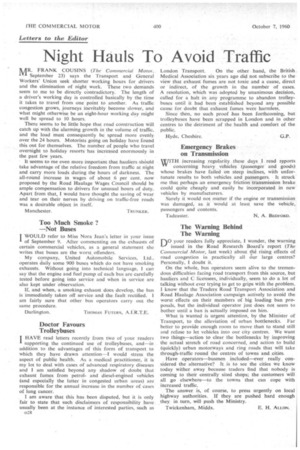Night Hauls To Avoid Traffic
Page 76

If you've noticed an error in this article please click here to report it so we can fix it.
AAR. FRANK COUSINS (The Commercial Motor, September 23) says the Transport and General Workers' Union seek shorter working hours for drivers and the elimination of night work. These two demands seem to me to be directly cOntradictory. The length of a driver's working day is controlled basically by the time it takes to travel from one point to another. As traffic congestion grows, journeys inevitably become slower, and what might otherwise be an eight-hour working day might well be spread to 10 hours.
There seems to be little hope that road construction will catch up with the alarming growth in the volume of traffic, and the load must consequently be spread more evenly over the 24 hours. Motorists going on holiday have found this out for themselves. The number of people who travel overnight to holiday resorts has increased enormously in the past few years.
It seems to me even more important that hauliers sheuld take advantage of the relative freedom from traffic at night and carry more loads during the hours of darkness. The all-round increase in wages of about 6 per cent. now proposed by the Road Haulage Wages Council should be ample compensation to drivers for unusual hours of duty. Apart from that, I would have thought the saving of wear and tear on their nerves by driving on traffic-free roads was a desirable object in itself.
Manchester. TRUNKER.
Too Much Smoke ?
• —Not Buses
I WOULD refer to Miss Nora Jean's letter in your issue of September 9. After commenting on the exhausts of certain commercial vehicles, as a general statement she writes that buses are the worst, offenders.
My company, United Automobile Services, Ltd.. operates daily some 900 buses which do not have smoking exhausts. Without going into technical language, 1 can say that the engine and fuel pump of each bus are carefully tested before going into service and when in service are also kept under observation.
If, and when, a smoking exhaust does develop, the bus is immediately taken off service and the fault rectified. I am fairly sure that other bus operators carry out the same procedure.
Darlington. THOMAS FUTERS,
Doctor Favours Trolleybuses
HAVE read letters recently from two of your readers supporting the continued use of trolleybuses, arid—in addition to the advantages of this form of transport to which they have drawn attention—I would stress the aspect of public health. As a medical practitioner, it is my lot to deal with cases of advanced respiratory diseases and I am satisfied beyond any shadow of doubt that exhaust fumes from petroland diesel-engined vehicles and especially the latter in congested urban areas) are responsible for the annual increase in the number of cases of lung cancer.
I am aware that this has been disputed, but it is only fair to state that such disclaimers of responsibility have usually been at the instance of interested parties, such as tal8 London Transport. On the other hand, the British.
Medical Association six years ago did not subscribe to the view that exhaust fumes are not toxic and a cause, direct or indirect, of the growth in the number of cases. A resolution, which was adopted by unanimous decision, called for a halt in any programme to abandon trolleybuses until it had been established beyond any possible cause for doubt that exhaust fumes were harmless.
Since then, no such proof has been forthcoming, but trolleybuses have been scrapped in London and in other centres to the detriment of the health and comfort of the public.
Hyde, Cheshire. G.P.
Emergency Brakes on Transmission
ITH increasing regularity .these days I read reports concerning heavy vehicles (passenger and goods) whose brakes have failed on steep inclines, with unfortunate results to both vehicles and passengers. It struck me that perhaps an emergency friction transmission brake could quite cheaply and easily be incorporated in new vehicles by manufacturers.
Surely it would not Matter if the engine or transmission was damaged, as it would at least save the vehicle, passengers and contents.
Tadcaster. N. A. BEDFORD.
The Warning Behind The Warning
no your readers fully appreciate, I wonder, the warning ;a' issued in the Road Research Board's report (The Commercial Motor, last week) about the rising effects of road congestion in practically all Our large centres? Personalty, I doubt it. .
On the whole, bus operators seem alive to the tremendous difficulties facing road transport from this source, but hauliers and C licensees, individually, seem to do a lot of talking without ever trying to get to grips with the problem. I know that the Traders Road Transport Association and Road Haulage Association campaign actively to avoid the worst effects on their members of big loading ban proposals, but the individual operator just does not seem to bother until a ban is actually imposed on him.
What is wanted is urgent attention, by the Minister of Transport, to the alleviation of urban bottlenecks. Far better to provide enough room to move than to stand still and refuse to let vehicles into our city centres. We want two things—action to clear the bottlenecks by improving the actual stretch of road concerned, and action to build (quickly) urban motorways and ring roads that will take through-traffic round the centres of towns and cities.
Have operators—busmen included—ever really considered the alternative? It is to see the cities we know today wither away because traders find that nobody is coming to their centrally sited shops; the customers will all go elsewhere—to the towns that can cope with increased traffic. "
The answer is, of course, to press urgently on local highway authorities. If they are pushed hard enough they, in turn, will push the Ministry.
Twickenham, Middx. E. H. ALLON.
































































































































